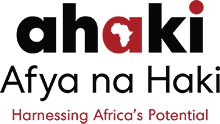Evidence Generation
The evidence generation sub-strategy primarily contributes to the positive African narratives pillar of Ahaki’s Africentric approach. Work on health and human rights and sexual and reproductive health and rights in the region is principally informed and framed by western, Eurocentric and colonial discourse as the dominant research paradigm. There is an unmet need for indigenous, context-specific research at national, sub-regional and regional levels required to influence policy that drives advocacy and informs policy to ease Africa’s burden of unmet reproductive health needs. Decolonisation demands an Africa-centred research approach to respond to the continent’s SRHR burden through the documentation and promotion of positive African narratives. To that end, Ahaki, through the evidence generation department, aims to conduct research on health, human rights and SRHR that builds knowledge for advocacy to support policy making and implementation.
The main objective of the sub-strategy is to conduct Africentric research that informs contemporary and emerging issues in health, human rights and SRHR within the region. Specifically, the department aims to document and sustain a body of knowledge that influences law and policy on health, human rights and development drawing Africentrism (experiences, narratives); and to tap into and harness research efforts towards health, human rights and SRHR, through existing scholars and practitioners.
The evidence-generation department currently conducts research through Ahaki’s running programmes. These include the Litigating Reproductive Justice in Africa programme (LIRA), the Africentric Advocacy and Research Approaches to Advancing Regional Vaccine Manufacturing and Access in Africa (ARMA), the Shaping, Strengthening and Sustaining a Community- Centred Social Accountability through COPASAH among others. Through these programmes, the department either conducts or coordinates desktop literature review, and interviews and other research interventions.
Target Audience
Our target audience is every key stakeholder in SRHR work, research and
advocacy spaces from government ministries, agencies and departments to academia and litigants and lawyers to community activists within the region and across the globe.
Strategic Interventions
The evidence generation department has three main interventions through which the foregoing aims.
- Research and evidence generation: Through this intervention, the department documents positive political, socio-economic, and cultural theory and praxis that promote health, human rights and SRHR. Currently, this is executed through a mixed methodological approach of quantitative and qualitative research, that is, desktop literature review, interviews, focus group discussions among others.
- Roundtable think-tank dialogues: Reminiscent of solemn knowledge-exchanging experiences of the African-fire place, this intervention seeks to generate knowledge through congregating several stakeholders on health, human rights and SRHR. This is done for a number of reasons; to promote the exchange, development and growth of ideas; to sustain networks of similar-minded individuals; and for the dissemination of Ahaki’s research findings through these for a.
- Hosting fellows: Ahaki’s Research Agenda will be undergirded by its fellowship programme, wherein it will host fellows for a specified duration. The fellowship is a residential programme of varying length as agreed upon between the Institute and the researcher. Fellows get the opportunity to see first-hand the efforts, progress and challenges that women, girls, sexual minorities, activists, scholars, and public officials encounter as they strive to make health, human rights and equitable access to SRSH a reality for everyone.
